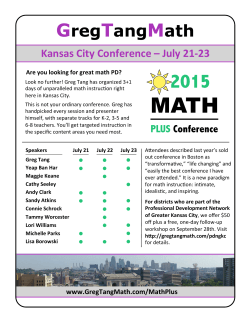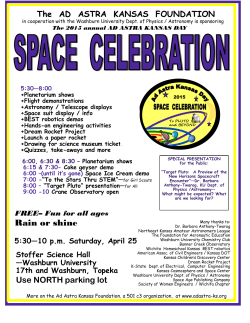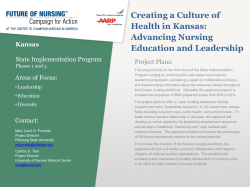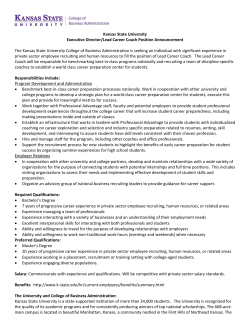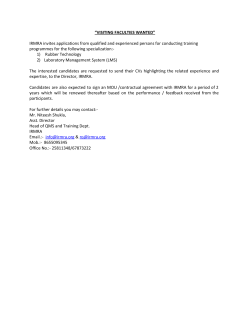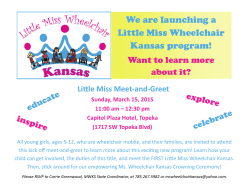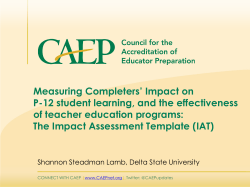
Conference Program 2015
Association of Teacher Educators (ATE-K)/ Kansas Association of Colleges of Teacher Education (KACTE) 2015 Spring Conference Preparing the Next Generation of Teachers: Showcasing Research and Best Practices That Enhance High Quality Teacher Education Kansas State University Bluemont Hall Manhattan, KS March 27, 2015 Registration 7:45 – 8:30 a.m. Room: 343/344 Registration Continental Breakfast Opening General Session 8:30 – 9:45 a.m. Room: 343/344 Conference Welcome Dr. Pam Green, President, Association of Teacher Educators – Kansas (ATE-K) Dr. Shane Kirchner, President, Kansas Association of Colleges of Teacher Education (KACTE) Dr. Debbie Mercer, Dean of Education, Kansas State University Introduction of Keynote Speaker Dr. Rick Ginsberg, Dean of Education, University of Kansas Keynote Address Preparing Candidates to Teach 21st Century Skills and How CAEP Can Foster Those Skills Stevie Chepko, Senior Vice President, Accreditation, Council for the Accreditation of Educator Preparation (CAEP) Conference Announcements Break 9:45 – 10:00 a.m. Concurrent Presentations – Session I 10:00 – 10:45 a.m. Room: 343/344 Creating Quality Assessments for CAEP Standard 1 Stevie Chepko, Senior Vice President, Accreditation Council for the Accreditation of Educator Preparation (CAEP) During this session, the rubric that will be used for evaluating assessments submitted for CAEP Standard 1 will be shared and reviewed. Examples of assessments will be provided for participants to review using the CAEP Assessment rubric, and guidelines for developing quality assessments will be presented. Room: 021 The Global Classroom: Engaging Kansas Pre-service Teachers and Swedish Ninth Graders in Authentic Literacy Experiences Dr. Lotta Larson, Kelsey Hedlund Kansas State University To prepare the next generation of teachers for a diverse and global world, pre-service teachers design web-based literacy lessons for students in Sweden who study English as a foreign language. This presentation highlights an authentic learning experience that promotes internationalization, integration of technology, and best practices in literacy education. Room: 119 Preparing Teacher Candidates to Support Military-Connected Learners Dr. Vicki Sherbert, Dr. Lori Levin Kansas State University The Military Child Education Coalition (2012) reports there are military-connected students in every school district in the United States. In this session, research-based strategies and resources will be presented for preparing teacher candidates to understand and meet the unique needs of military-connected learners in their classrooms. Room: 121 The Rapidly Changing Face of American Education: Ramifications for Teacher Educators Tiffany Smith, Courtney Davis, Carolyn Wallace, Alise Anderson, Kate Lander Emporia State University Initial findings in our Study of Teacher Engagement Issues and Organizational Causes for Them show how schools are beginning to change with regard to teacher professional involvement, therefore suggesting the need to better prepare new teachers in areas such as curriculum design, professional leadership, research, and program innovation. Concurrent Presentations – Session II 10:55 – 11:40 a.m. Room: 343/344 Preparing Candidates to Engage Students in Learning Stevie Chepko, Senior Vice President, Accreditation Council for the Accreditation of Educator Preparation (CAEP) This presentation will explore the role of student engagement on student learning with a specific emphasis on college and career readiness skills (CAEP component 1.4). A focus will be on assessing student engagement and teaching transferable skills such as critical thinking and problem solving. Room: 021 Common Sense About the Common Core Kirsten Limpert Emporia State University Preparing education students to implement Common Core State Standards (CCSS) is an essential skill needed in teacher preparation courses. This presentation is for those who teach curriculum courses as we will share ideas and activities that help students learn about CCSS and how to incorporate these standards in the curriculum. Room: 119 ESOL Students’ Perceptions of Their English Language Proficiency and Online Teaching Strategies to Enhance Language Skill Development Dr. Ahn Tran Wichita State University Pre-service ESOL teachers conducted a survey on ESOL students’ perceptions of their English speaking, listening, reading, and writing skills. The survey findings inspired these candidates to explore ways to help the students improve their language skills both in class and at home. Findings and step-by-step teaching guides will be provided. Room: 121 Let’s Get Digital with Book Chats Erin Meyer Kansas State University Digital book chats, created by pre-service elementary educators, use new literacies to engage students in reading. This session promotes traditional literacies using new literacies and 21st century skills. Educators at all levels can take away ideas to use digital media to encourage best literacy practices. Luncheon General Session 11:45 a.m. – 12:45 a.m. Room: 343/344 Lunch Luncheon Keynote Address Building Growth Mindsets – It’s Not Where You Start, It’s Where You Finish Shannon Ralph, 2015 Kansas Teacher of the Year U.S.D. 443 Dodge City Public Schools Break 12:45 – 12:55 p.m. Concurrent Presentations – Session III 12:55 – 1:40 p.m. Room: 021 A Collaborative Linguistic and Early Literacy Curriculum to Prepare the Next Generation of Teachers Dr. Ashlie Jack, Dr. Gayla Lohfink Wichita State University This presentation describes WSU’s innovated elementary education program of a collaborative, linguistic and early literacy curriculum designed to foster candidates’ abilities to teach English Language Learners. Participants will view the program restructurings, alignment of linguistic content to early literacy methods, and data reflective of candidates’ effectiveness as high quality educators. Room: 119 English Language Learner (ELL) Education: A Global Partnership with Mexico Dr. Sherri Brantley, Dr. Lorie Cook-Benjamin Fort Hays State University This presentation highlights a collaborative partnership between teacher education candidates, higher education faculty, and a volunteer elementary school in Mexico. Through the use of technology and an optional study abroad trip to Mexico, teacher candidates provide varied supports to promote the ELLs’ language skills. Room: 121 Robots, Tracking, and Video Monitors: Technology as a Vehicle for Enabling Distance Supervision Dr. David Allen, Dr. Lori Goodson Kansas State University Twyla Sprouse, USD 383 Manhattan-Ogden Public Schools Allison Rothwell, USD 475 Geary County Public Schools This session will present ongoing attempts to investigate distance supervision models through the use of contemporary technologies (SWIVL Robot, Zoom Conference Software) from the school-based supervisors and the university faculty perspectives. Technological issues and troubleshooting will be discussed along with the effectiveness of the model. Room: 225 WorldFATE Might Be YOUR Fate: International Teacher Education Collaboration Possibilities Dr. Rick Gibson, Dr. Dona Gibson Friends University If you are a member of ATE, you are also a member of WorldFATE, the World Federation of Associations of Teacher Education. There are no additional dues, only increased opportunities for collaborating with Teacher Educators from around the World. Learn to make WorldFATE your fate! Pre-service Teacher Strand 1:00 – 2:00 p.m. Room: 343/344 Using Inquiry Instruction to Build Growth Mindsets Shannon Ralph, 2015 Kansas Teacher of the Year U.S.D. 443 Dodge City Public Schools In this session, we will discuss what inquiry is and explore how using inquiry as key content delivery positively affects student learning, regardless of the age of the student. We will also investigate how to build growth mindsets which are necessary for long term success. Concurrent Presentations – Session IV 1:50 – 2:35 p.m. Room: 021 Teaching Delayed Gratification: Reducing Temper Tantrums of Children with Autism Spectrum Disorders After Functional Communication Training Dr. Seungyeon Lee University of Arkansas at Monticello 2014 ATE-K Distinguished Dissertation Award Recipient Temper tantrums among young children are common, especially those with autism spectrum disorders. The main goal of this study was to compare various types of tolerance for delayed reinforcement training with three, preschool-aged children. Implications for teachers and parents working with young children prone to temper tantrums are discussed. Room: 119 A Service-Learning Internship: Connecting Pre-service Teachers with the Community Dr. Valerie Zelenka, Dr. Beth Walizer Fort Hays State University Bullying is a problem that impacts 70-80% of school children. Fortunately, we found a solution to help combat this problem. This presentation will showcase our Read4Respect Bullying Prevention Project. This project included an after school literacy tutoring program, young readers’ conference, and a home library for economically disadvantaged at-risk students. Room: 121 Early Childhood Unified: Multiple Pathways and Multiple Partnerships Dr. Jennifer Stone, Dr. Jeri Carroll Wichita State University This presentation will highlight how multiple licensure pathways compare in terms of successful program completers, newly licensed ECU professionals, and teachers employed in the field, demonstrating the need for quality collaborative partnerships that allow for successful field placements as well as unique approaches to educator preparation in ECU. Room: 225 Preparing Culturally Responsive Next Generation Teachers through an Online Graduate Course Dr. Yaprak Dalat Ward Fort Hays State University This presentation features best practices of an online graduate course on cultural diversity. Assessment and anecdotal data from over 250 course attendees indicate that student engagement through the use of digital tools increases the probability of attaining cross-cultural knowledge, skills and abilities to become culturally responsive next generation teachers. Room: 256 Voices from the Field: Students’ Biographies at the Heart of Pedagogy Dr. Della Perez, Zachary Bomberger, Maria Jose Morocho Orozco, Maria Patricia Gonzalez Parra, Lucila Sanchez Perez, Natalie Rawlings, Luis Peralta Sari Kansas State University The biography-driven instruction model (Herrera, 2010) highlights the importance of teachers building upon students’ assets and interaction to support linguistic and academic development. This presentation will demonstrate how Masters teachers from Ecuador and domestic pre-service teachers have highlighted the student biography within their instructional efforts in Ecuador and at KSU. Closing General Session 2:45 – 3:15 p.m. Room: 343/344 Association Announcements/Updates Special Awards/Recognitions Closing Remarks Association Business Meetings Room: 119 ATE-K Business Meeting Room: 121 KACTE Business Meeting 3:15 – 4:00 p.m.
© Copyright 2025
